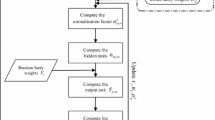Abstract
Radial basis function networks and fuzzy rule systems are functionally equivalent under some mild conditions. Therefore, the learning algorithms developed in the field of artificial neural networks can be used to adapt the parameters of fuzzy systems. Unfortunately, after the neural network learning, the structure of the original fuzzy system is changed and interpretability, which is considered to be one of the most important features of fuzzy systems, is usually impaired. This Letter discusses the differences between RBF networks and interpretable fuzzy systems. Based on these discussions, a method for extracting interpretable fuzzy rules from RBF networks is suggested. Simulation examples are given to embody the idea of this paper.
Similar content being viewed by others
References
Bishop, C. M.: Neural Networks for Pattern Recognition, Oxford University Press, Oxford, UK, 1995.
Hayashi, Y.: A neural expert system with automated extraction of fuzzy if-then rules and its application to medical diagnosis, Advances in Neural Information Processing Systems, 3 (1990), 578–584.
Ishbuchi, H. Nakashima, T. and Murada, T.: Multi-objective optimization in linguistic rule extraction from numerical data, In: Proceedings of 1st International Conference on Evolutionary Multi-criterion Optimization, pp. 588–602, 2001.
Jang, J.-S. R. and Sun, C.-T.: Functional equivalence between radial basis functions and fuzzy inference systems, IEEE Trans. on Neural Networks, 4 (1993), 156–158.
Jang, J.-S. R. and Sun, C.-T.: Neuro-fuzzy modeling and control, Proceedings of the IEEE, 83 (1995), 378–405.
Jin, Y.: Fuzzy modeling of high-dimensional systems: Complexity reduction and interpretability improvement, IEEE Transactions on Fuzzy Systems, 8(2) (2000), 212–221.
Jin, Y., von Seelen, W. and Sendhoff, B.: An approach to rule-based knowledge extraction, In: Proceedings of IEEE Int. Conf. on Fuzzy Systems, pp. 1188–1193, Anchorage, AL, 1998.
Jin, Y., von Seelen, W. and Sendhoff, B.: On generating FC3 fuzzy rule systems from data using evolution strategies, IEEE Trans. on Systems, Man, and Cybernetics, 29 (1999), 829–845.
Lofti, A. and Tsoi, A. C.: Interpretation preservation of adaptive fuzzy inference systems, Int. Journal of Approximating Reasoning, 15, 1996.
Moody, J. and Darken, C.: Fast learning in networks of locally-tuned processing units, Neural Computation, 1 (1989), 181–194.
Powell, M.: Radial Abasis functions for multivariable interpolation: A review. In: C. Mason and M.G. Cox, (eds.), Algorithms for Approximation, pp. 143–167, Oxford University Press, Oxford, UK, 1987.
Setnes, M., Babuska R. and Verbruggen, B.: Rule-based modeling: Precision and transparency, IEEE Transactions on Systems, Man, and Cybernetics - Part C: Applications and Reviews, 28(1) (1998), 165–169.
Takagi, T. and Sugeno, M.: Fuzzy identification of systems and its applications to modeling and control, IEEE Trans. on Systems, Man, and Cybernetics, 15 (1985), 116–132.
Tickle, A., Andrews, R., Golea M. and Diederich, J.: The truth will come to light: Directions and challenges in extracting the knowledge embedded within trained artificial neural networks, IEEE Transactions on Neural Networks, 9(6) (1998), 1057–1068.
Towell, G. and Shavlik, J.: Extracting refined rules from knowledge-based neural networks, Machine Learning, 13 (1993), 71–101.
Valente de Oliveira, J.: On the optimization of fuzzy systems using bio-inspired strategies, In: IEEE Proceedings of International Conference on Fuzzy Systems, IEEE Press, pp. 1129–1134, Anchorage, Alaska, 1998.
Zadeh, L. A.: Outline of a new approach to the analysis of complex systems and decision processes, IEEE Trans. on Systems, Man, and Cybernetics, 3 (1973), 18–44.
Author information
Authors and Affiliations
Rights and permissions
About this article
Cite this article
Jin, Y., Sendhoff, B. Extracting Interpretable Fuzzy Rules from RBF Networks. Neural Processing Letters 17, 149–164 (2003). https://doi.org/10.1023/A:1023642126478
Issue Date:
DOI: https://doi.org/10.1023/A:1023642126478




